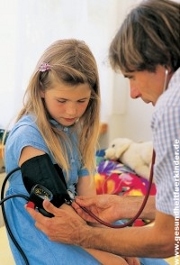High blood pressure in old age
A certain increase in blood pressure over the years is normal. The values of children and adolescents up to 14 years of age are significantly lower than those of adults.
A particularly critical increase runs between the ages of 40 and 50. This is probably related to the menopause. Women of this age often misinterpret the symptoms of hypertension and consider these signs of menopausal symptoms or generally too much stress. If there are noticeable signs of high blood pressure, it is advisable to have the possible triggers clarified.
Blood pressure in older people is usually higher than that in younger people. The normal blood pressure values in older people are slightly higher than the normal values in adults of younger age. But that doesn’t mean that high blood pressure is harmless in old age. Too high blood pressure in old age increases mortality by 2 to 5 times, in cardiovascular diseases – by 2-3 times. A sudden and massive increase in blood pressure in the elderly is particularly dangerous as it can be the cause of a hypertensive crisis, stroke or heart attack. The higher the "upper" value rises, more this risk is higher. Normal blood pressure for seniors is around 140 to 80-85.
The normal blood pressure by age
| Age | systolic in mmHG | diastolic in mmHG |
| Premature babies | 45-50 | |
| newborn | 70-80 | |
| infant | 70-85 | |
| small child | 85-95 | 60 |
| Children and adolescents | 95-101 | 60-74 |
| Adults | 120-129 | 80-84 |
| Seniors | Causes of hypertension in old age |
Hypertension can arise from many different causes. The main difference in high blood pressure in old age is a combination with chronic comorbidities. After 50 years le />
The second characteristic of hypertension in the elderly is a slower metabolism. This means that drugs, including antihypertensive drugs, are excreted more slowly from the body, so the dosage needs to be adjusted.
Age itself leads to the development of high blood pressure. Above 50, the elasticity of the vessels decreases – the vessel walls become more rigid and the pressure compensation no longer works as well.
With increasing age, the balance of different substances that circulate in the blood and affect the vascular tone changes. Thus, the number of substances that relax the vessels and those that narrow the arteries increases. Blood pressure above 60 often rises due to age-related changes in the kidneys. The kidneys are both "victims" and the cause of high blood pressure.
Impaired renal function in the elderly often leads to high blood pressure. The number of the basic structural unit of the kidney – kidney corpuscles – is greatly reduced in old age, compared to a 30-year-old by about 35 percent. The glomerular filtration rate decreases due to the reduced concentration of the kidney corpuscles. In addition, arteriosclerosis or narrowing of the arteries limits the filtering performance of the kidneys and increases the risk of high blood pressure.
Other causes of high blood pressure in old age
In addition to the age-related causes, age-independent diseases can also cause high blood pressure in people over 60 years of age.
- adrenal-,
- thyroid-,
- Neurological disorders
Frequent strong emotions (both positive and negative), obesity, bad habits, and excessive salt consumption can also trigger high blood pressure.
Symptoms of hypertension in old age

Symptoms that indicate increased blood pressure in the elderly:
- palpitations
- a headache
- dizziness
- nausea
- tinnitus
The symptoms described, which indicate a possible high blood pressure, do not have to occur together. To clarify these symptoms, a doctor should be consulted for safety. Even a slightly elevated blood pressure must be treated by a doctor to avoid more serious illnesses.
These symptoms also occur in many other diseases, so it is important to measure your blood pressure regularly to identify the risk of high blood pressure early enough. A high blood pressure from the age of 60 runs with significantly more complications than middle-aged. It can cause fainting, a stroke, and other significant health problems.
Low blood pressure in old age
Low blood pressure in old age is not uncommon. Although hypotension is not diagnosed as often as hypertension, this condition is no less dangerous. Elderly people with low blood pressure often have problems with a sudden change of body position, as the condition of the cardiovascular system worsens over the years. Dizziness can lead to loss of consciousness, which can be life-threatening, especially in old age. The problem of loss of consciousness can occur particularly often in older people who stay in bed for a long time due to serious illnesses, injuries or operations, or who are constantly taking antihypertensive drugs.
Blood pressure in the elderly can be due to various factors suddenly rise or fall extremely. The blood pressure can be checked by regular blood pressure measurements. If you have persistently low blood pressure and symptoms such as shortness of breath, rapid heartbeat and other symptoms, you need to see a doctor.
Causes of hypotension in old age
Low blood pressure in old age is just like high blood pressure with age-related changes in the body such as B. associated with a heart failure.
A medical examination is therefore recommended to clarify the causes behind the low blood pressure.
Heart work worsens with age, the organs and tissues do not receive a sufficient amount of blood or too little oxygen and nutrients. The narrowing of the coronary arteries or arteries in old age is also a common cause of blood pressure problems.
Other factors that contribute to the development of hypotension in the elderly are:
- Decrease in the amount of circulating blood as a result of bleeding or anemia
- Neurocirculatory dystonia and vascular hypotonic type dystonia
- Endocrine disorders
Hypotension is divided into three forms: primary or essential, secondary or symptomatic and orthostatic hypotension. However, the causes cannot always be clearly distinguished from one another.
RELATED ITEMS
-

Introduction Low blood pressure (hypotension) means blood pressure below 105/60 mmHg. The normal value of blood pressure is 120/80…
-

Adolescents high blood pressure in children
Obesity as a cause of hypertension in children High blood pressure is now a problem that has hit many people in Germany, but in the…
-

Low blood pressure and orthostatic syndrome (arterial hypotension)
Low blood pressure (= arterial hypotension) is particularly common in tall, slim adolescents during puberty, especially in girls. Often…
-

Blood pressure high – hypertension in children and adolescents, city practices berlin
Competence Center for Cardiology informs: Blood pressure high – hypertension in children and adolescents Definition of blood pressure high – hypertension in children…
